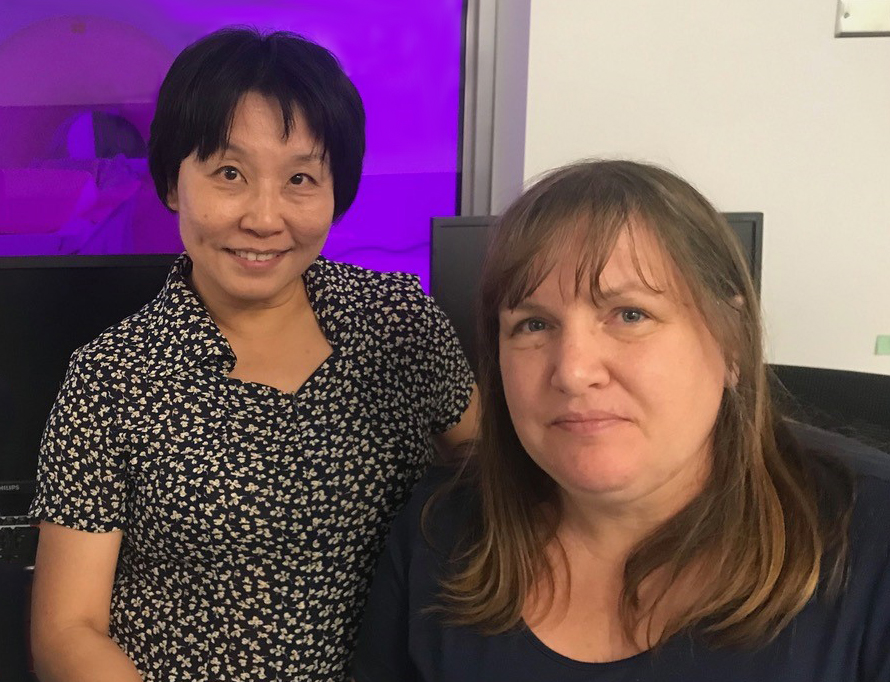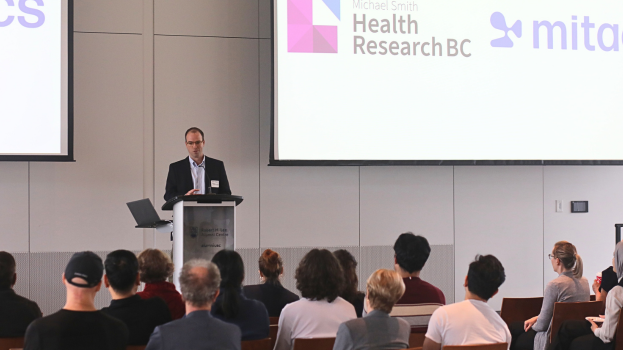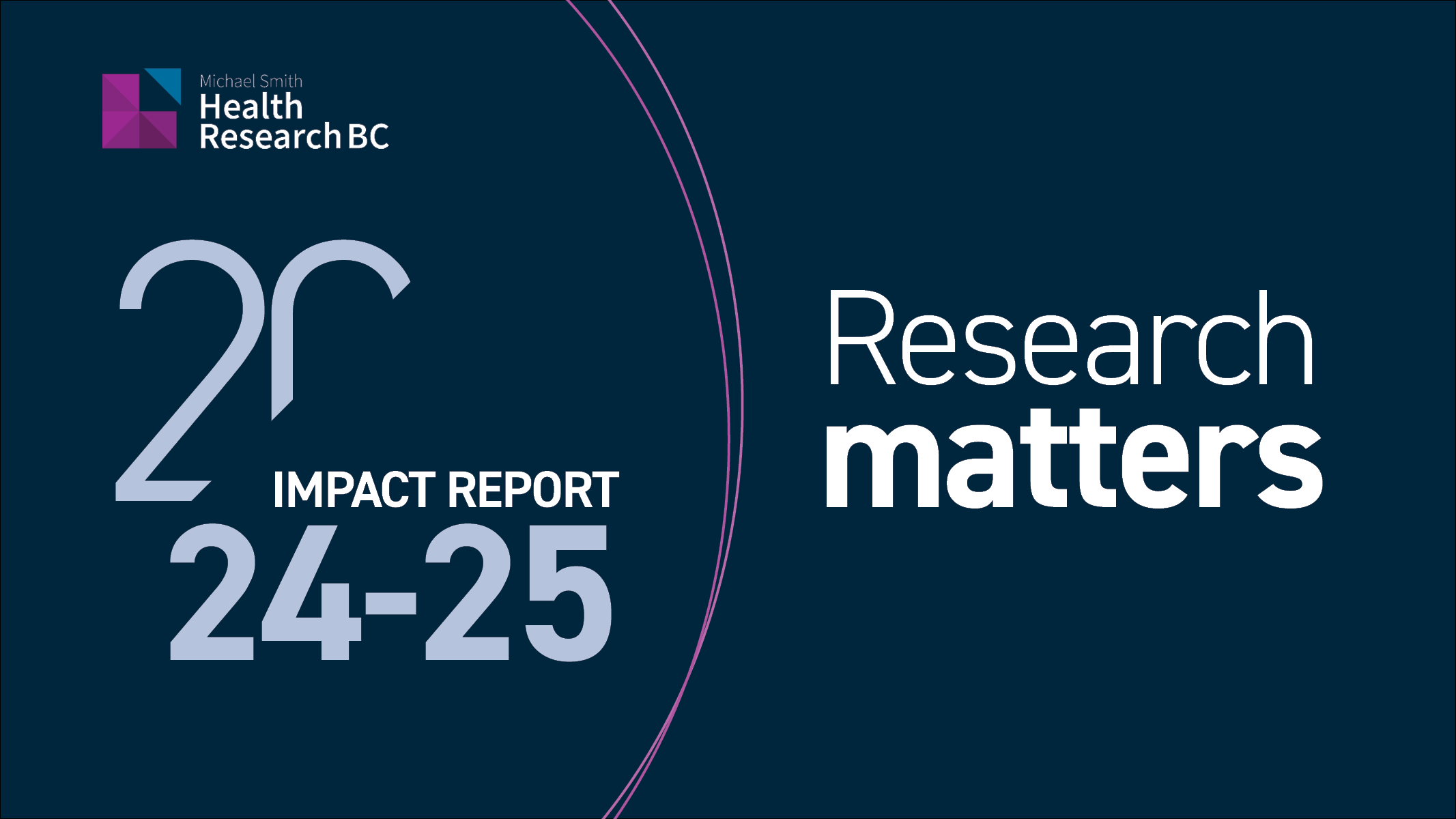Brain imaging research brings new hope for people with life-altering condition
18 April 2023

Dr. Xiaowei Song in a brain imaging lab. With permission from Fraser Health.
Kati Debelic felt like she had the flu or a viral illness. But the symptoms didn’t go away. A Registered Nurse working in cancer care, Kati was diagnosed with myalgic encephalomyelitis, also known as chronic fatigue syndrome, at age 39. In the 14 years since, she’s been fighting for medical support and recognition, despite the challenges of the illness.
Over 77,000 people in BC are estimated to have myalgic encephalomyelitis (ME), and most of these are women. There’s no single known cause for ME, but it often follows a flu-like illness. People with ME experience a range of symptoms, including extreme fatigue, pain, disrupted sleep, and neuro-cognitive challenges. One key sign of ME is when symptoms worsen after being mentally or physically active – effects that can last anywhere from a few days to a few months.
“My symptoms can get worse when I exert myself physically, spend too much time thinking or simply talk on the phone,” said Kati. “People living with ME are sick for the rest of their lives. There’s no cure – we do not get better from this. Often, we are not even taken seriously in the doctor’s office.”
The condition may be outright dismissed by doctors who aren’t aware of ME’s profound effect on people’s daily lives. Doctors may have limited knowledge of the disease and diagnosis can take many years, which delays interventions that prevent severe illness. Conditions like ME are more often overlooked when experienced by people of colour, Indigenous people and women. These barriers keep people from seeking and accessing the care they need.

We’re fighting for our lives
In 2018, Kati met Dr. Xiaowei Song, a senior clinical neuroimaging scientist at Fraser Health. Until then, Xiaowei had focussed on brain health and aging. Her imaging techniques were identified by patients with ME to help explain the effects of ME on brain health. Xiaowei and Kati clicked from the start, and they have been working together on research ever since.
“Myalgic encephalomyelitis has no diagnostic tools or treatments, and I want to change that,” said Kati. “Reaching out to Xiaowei and participating in research is so important to me and to our community. We’re fighting for our lives.”
Kati and Xiaowei partnered with Dr. Luis Nacul, a physician at BC Women’s Hospital, on a pilot project. Together, they wanted to find out whether ME symptoms derive from physical changes in the brain. If physical changes could be demonstrated, this would provide direct evidence that the symptoms people experience are real, not imagined. This evidence will help address the stigma around the symptoms linked to ME.
Patient experiences key to project success
Xiaowei knew that patient engagement was vital to the project’s success. With support from the BC SUPPORT Unit Fraser Centre at Fraser Health, the research team was able to include three patient partners in the research project and trained five students in patient-oriented research. Patient-oriented research is done in partnership with patients and aims to improve health care and outcomes for patients.
The BC SUPPORT Unit, part of Health Research BC, is a provincial initiative that champions the participation of people with lived experience and communities in research and improves ways to put this research evidence into practice. The BC SUPPORT Unit Fraser Centre supports collaborations between care providers and decision-makers at Fraser Health with academic patient and community partners in the Fraser region. Project support was also provided by Simon Fraser University and Fraser Health’s Department of Evaluation and Research Services.
“From day one, I was totally moved by our patient partners’ motivation to have researchers address the gap in knowledge about ME, or chronic fatigue syndrome,” said Xiaowei. “They educated our team about the disease and suffering they experienced. They helped organize patient panels, prepare the grant application, share their views and assist the entire project. Without them, this project wouldn’t have been successful.”
Working with the Myalgic Encephalomyelitis & Fibromyalgia Society of BC, the research team engaged a patient panel discussion. The discussion provided research team members with perspectives on ME symptoms, management, and patient-oriented research needs. By partnering with patients, the team better understood how to meet study participants’ mental, physical and communications needs.
“Our goal with the pilot project was to see if this patient group was able to complete such a complex study,” said Xiaowei. “The participants were very committed and completed one hundred percent of the study tests. So, we’re very confident that we can scale up the project to include more participants.”
There are brain differences in people living with ME
Using brain imaging technology, Xiaowei and her team compared brain structure and function in ME patients to those of non-patients. They measured brain function, metabolism and anatomy for possible inflammation, and examined potential differences between the two groups.
They also measured brain activity during tasks related to memory, learning and motivation. Preliminary results showed that accuracy decreased and reaction time increased as tasks became more challenging in the patient group. Overall, their work suggested possible brain changes that may help explain many of the diverse symptoms experienced by people living with ME.
The research team has published a highly-viewed literature review related to brain imaging and ME, and they are developing two conference papers and a peer-reviewed article to share the project findings. Working with Dr. Nacul and other clinical researchers, Xiaowei is also exploring how the ME project protocol can be adapted to investigate brain changes of people with long-COVID.
“Before Xiaowei and her team took up this challenge, there was no research done on ME using brain imaging in BC,” said Kati. “We now have more information about the disease and how it affects brain function. This work means hope for our community.”
References
BC Women’s Hospital. (n.d.) Myalgic Encephalomyelitis/Chronic Fatigue Syndrome (MC/CFS). Retrieved March 9, 2023 from http://www.bcwomens.ca/health-info/living-with-illness/chronic-fatigue-syndrome-(me-cfs)
Government of Canada. (2021, March). Canadian Pain Task Force Report: March 2021. Retrieved March 9, 2023 from https://www.canada.ca/en/health-canada/corporate/about-health-canada/public-engagement/external-advisory-bodies/canadian-pain-task-force/report-2021.html
HealthLinkBC. (2021). Myalgic Encephalomyelitis/Chronic Fatigue Syndrome. Retrieved March 9, 2023 from https://www.healthlinkbc.ca/illnesses-conditions/fatigue-and-sleep/myalgic-encephalomyelitischronic-fatigue-syndrome
Myalgic Encephalomyelitis & Fibromyalgia Society of BC. (2019, Apr 22). The unmet health care needs for British Columbians living with Myalgic Encephalomyelitis (ME). Retrieved March 9, 2023 from https://www.mefm.bc.ca/post/society-s-unmet-needs#:~:text=More%20than%2077%2C000%20British%20Columbians,multiple%20systems%20in%20the%20body.
Myalgic Encephalomyelitis & Fibromyalgia Society of BC. (2020, Aug 10). The MD | FM Society of BC is pleased to share exciting news about our new ME patient-oriented research. Retrieved March 9, 2023 from https://www.mefm.bc.ca/post/the-me-fm-society-of-bc-is-pleased-to-share-exciting-news-about-our-new-me-patient-oriented-research
Nelson T, Zhang LX, Guo H, Nacul L and Song X (2021) Brainstem Abnormalities in Myalgic Encephalomyelitis/Chronic Fatigue Syndrome: A Scoping Review and Evaluation of Magnetic Resonance Imaging Findings. Front. Neurol. 12:769511. doi: 10.3389/fneur.2021.769511





